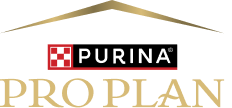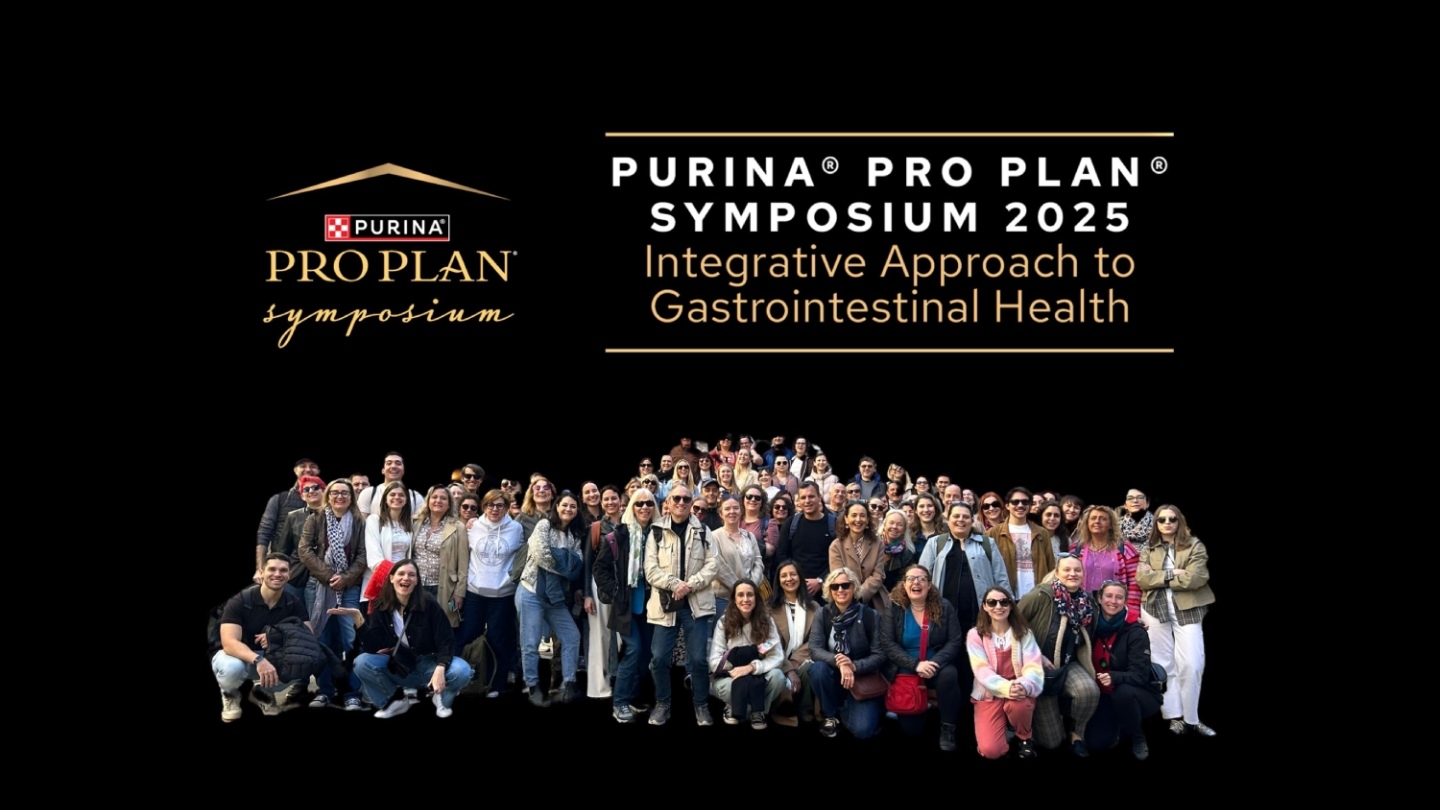
Purina PRO PLAN Symposium 2025: Leading Experts Converge on Integrative Gastrointestinal Health, AI, and Wellbeing
Purina PRO PLAN, in collaboration with the European Society of Comparative Gastroenterology (ESCG) , successfully hosted the highly anticipated Purina PRO PLAN Symposium 2025, a hybrid event held in Siena, Italy, that brought together over 110 Key Opinion Leaders (KOLs) in person and garnered over 850 virtual registrations from around the globe The symposium focused on an integrative approach to gastrointestinal health in dogs and cats, with the overarching goal of equipping veterinary professionals with valuable knowledge and practical tools to advance their practice, with the final objective of enhancing the health and well-being of their beloved pets as well as their own mental health and efficiency as veterinary professionals.
The symposium featured a diverse range of essential topics, including fat digestion and hyperlipidemia, microbiota analysis, Protein-Losing Enteropathy (PLE), mental resilience, and the veterinary digital landscape. Esteemed specialists in veterinary medicine and research shared their expertise and insights throughout the day.
Key highlights from the presentations included:
- Dr. Panos Xenoulis, DVM, Dr.med.vet., PhD - Professor of Medicine, University of Thessaly, Adjunct Professor, Texas A&M University, addressed tackling complex hyperlipidemia cases, emphasizing that canine hyperlipidemia is an increasingly recognized and clinically important condition requiring a systematic diagnostic approach involving fasting serum triglyceride and/or cholesterol measurements. He outlined management strategies centered on dietary modification with ultra-low-fat diets for primary hyperlipidemia and low-fat diets for persistent secondary hyperlipidemia, noting the potential benefit of omega-3 fatty acid supplementation. Dr. Xenoulis also highlighted that severe hyperlipidemia in dogs with pancreatitis often indicates concurrent primary or secondary hyperlipidemia.
- Dr. Cecilia Villaverde (BVSc, PhD, Diplomate ACVIM (Nutrition), Diplomate ECVCN) & Dr. Christina Germain (PhD, Principal Nutritionist at Nestle Purina Petcare), co-presented on fat digestion and its crucial role in managing acute and chronic gastrointestinal diseases in dogs and cats. They emphasized that dietary fat modification (amount and type) is crucial in conditions like chronic inflammatory enteropathies (especially PLE) and pancreatitis. Low-fat intestinal diets are commonly recommended for acute canine pancreatitis, particularly when associated with hyperlipidemia. For canine Protein-Losing Enteropathy (PLE), moderating dietary fat is often the first recommendation. They also highlighted the potential benefits of omega-3 fatty acids (EPA and DHA) for inflammatory intestinal diseases.
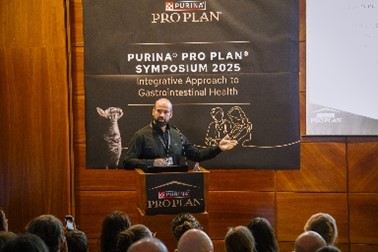
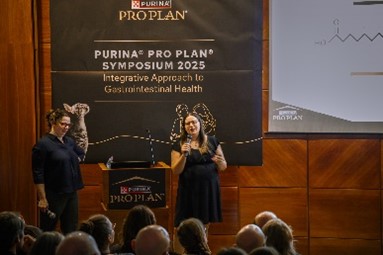
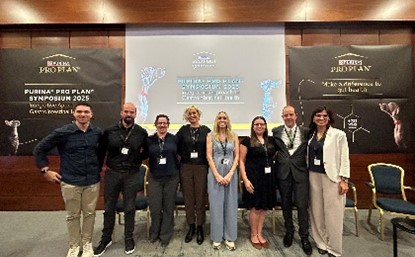
- Dr. Linda Toresson, PhD, Post Doctoral Research Associate, Gastrointestinal Laboratory, Texas A&M University, provided a comprehensive approach to microbiota analysis interpretation, explaining the vital role of the intestinal microbiome in GI health. She discussed the limitations of bacterial culture and 16S rRNA gene sequencing for individual patient assessment and presented the dysbiosis index (DI) as a potentially beneficial commercially available qPCR-based tool for assessing the balance of core intestinal bacteria and guiding treatment in non-responsive enteropathies (NRE). Dr. Toresson noted that a higher DI often correlates with lower microbial diversity and impaired gastrointestinal function.
Dr. Julien Dandrieux, PhD DACVIM (SAIM) - Senior Lecturer in Small Animal Medicine, focused on Protein-Losing Enteropathy (PLE) in canines, noting its association with a guarded prognosis in dogs with CIE and hypoalbuminaemia. He explained the current approach of excluding extra-intestinal diseases before considering a diet trial (low-fat or hydrolyzed). Prednisolone remains a common first-line immunomodulator, with anti-inflammatory dosages often sufficient. Dr. Dandrieux also highlighted small cell lymphoma (SCL) as an important differential diagnosis with a significantly worse prognosis.
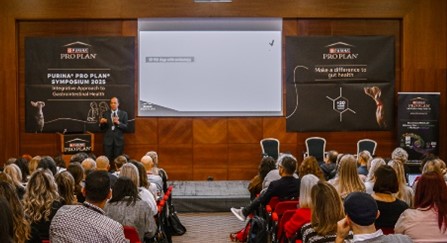

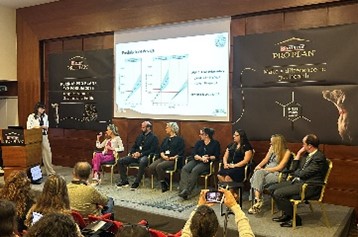
- Dr. Adele Williams-Xavier, BVSc MRCVS DipECEIM PhD, Founder, AiWX Consultancy, explored the transformative potential of Artificial Intelligence (AI) in veterinary practice. Her session showcased AI's ability to automate repetitive tasks, improve efficiency in client communication and appointment scheduling, aid in consultations through ambient listening technology, serve as a clinical decision support tool, and enhance diagnostics and imaging. Dr. Williams-Xavier stressed that veterinary expertise remains crucial for validating AI suggestions and highlighted AI's applications in various aspects of clinic operations, including in-patient monitoring, stock control, billing, client follow-ups, business management, and marketing.
- Laura Woodward, MVB; CertVR; CertSAS; DipCouns; MRCVS, addressed the critical topic of mental resilience for veterinary professionals. She stressed the importance of psychological wellbeing, often overshadowed by technical training, and introduced positive psychology tools to improve mental health and job satisfaction. These tools included boosting optimism, building resilience as preparedness for adversity, practicing self-compassion, and the use of affirmative language. Ms. Woodward emphasized that happiness at work improves productivity and reduces staff turnover, and the vital role of social connection for overall wellbeing.
The Purina PRO PLAN Symposium 2025 underscored Purina's dedication to advancing veterinary nutrition science, particularly in gastroenterology, through continuous research and collaboration. It demonstrated as well the truly admirable solid commitment from all the attendees to the scientific advance of veterinary medicine. So, all in all, this event fostered collective global collaboration with the ultimate aim of improving the health and well-being of companion animals. Together, we can create a brighter future for all.
Additionally, the recordings of the presentations are available in 6 languages: English, Spanish, French, Italian, German, and Portuguese:
Practical information:
- You can download the Symposium Proceedings here.
- Access the Recording of the Scientific Session:
- Access the Speaker’s Presentations here.
- The photo gallery is available in this link.
For more information about the PURINA® PRO PLAN® Symposium 2025 and future events, please visit Vet Center, or contact purinaproplansymposium@purina.nestle.com.
About Purina PRO PLAN®
Purina PRO PLAN is on a mission to become the most recognized pet food brand globally, improving the lives of dogs and cats through the power of ground-breaking nutrition. Our commitment to the well-being and longevity of pets drives Purina PRO PLAN to provide proven nutrition, backed by science, and developed with our Purina vets & experts. Committed to innovation and excellence, Purina PRO PLAN leverages Purina's expertise in nutrition and animal science to set high standards, anticipating the evolving needs of pets and those who care for them. For more information about Purina PRO PLAN and our commitment to pet nutrition, visit: https://www.purina.co.uk/brands/pro-plan
About Purina
Nestlé Purina PetCare Europe believes that when people and pets bond, life becomes richer. This is why, for more than 130 years, it has been committed to creating richer lives for pets and the people who love them through high-quality nutrition and care.
Purina Europe aims to have a positive impact on pets, people, and the planet. In 2022, the company launched six new Purina Commitments (2023-2030) to help reach this goal, to support adoption and responsible pet ownership, help the wellbeing of people in vulnerable situations and support the regeneration of soil and ocean ecosystems.
The Purina portfolio includes many of the best-known and best-loved pet foods including Felix®, Purina ONE®, Gourmet® and PRO PLAN®. For more information about the company, visit: https://www.purina.eu/
